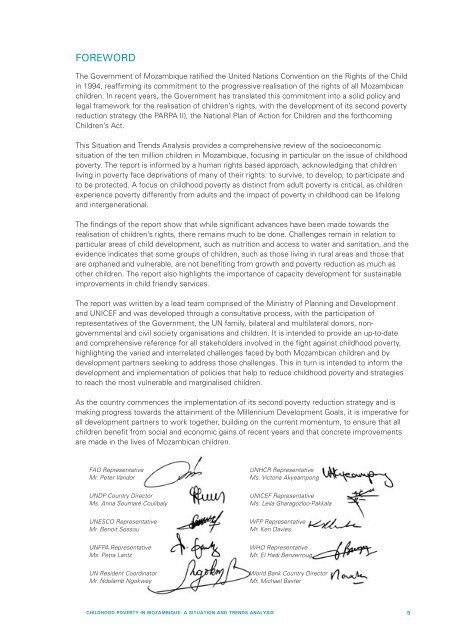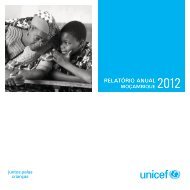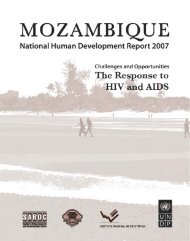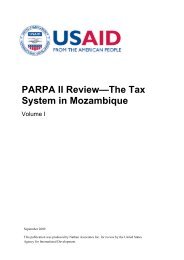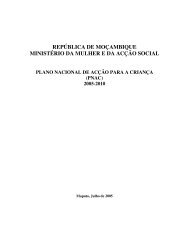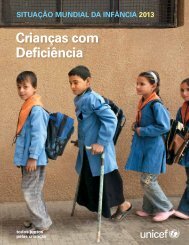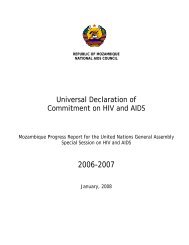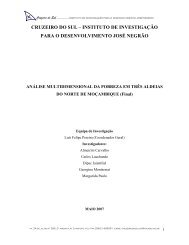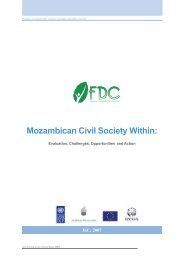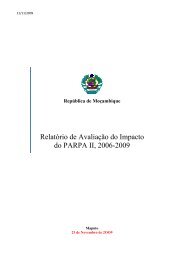Child Poverty in Mozambique. A Situation and Trend ... - Unicef
Child Poverty in Mozambique. A Situation and Trend ... - Unicef
Child Poverty in Mozambique. A Situation and Trend ... - Unicef
You also want an ePaper? Increase the reach of your titles
YUMPU automatically turns print PDFs into web optimized ePapers that Google loves.
FOREWORD<br />
The Government of <strong>Mozambique</strong> ratified the United Nations Convention on the Rights of the <strong>Child</strong><br />
<strong>in</strong> 1994, reaffirm<strong>in</strong>g its commitment to the progressive realisation of the rights of all Mozambican<br />
children. In recent years, the Government has translated this commitment <strong>in</strong>to a solid policy <strong>and</strong><br />
legal framework for the realisation of children’s rights, with the development of its second poverty<br />
reduction strategy (the PARPA II), the National Plan of Action for <strong>Child</strong>ren <strong>and</strong> the forthcom<strong>in</strong>g<br />
<strong>Child</strong>ren’s Act.<br />
This <strong>Situation</strong> <strong>and</strong> <strong>Trend</strong>s Analysis provides a comprehensive review of the socioeconomic<br />
situation of the ten million children <strong>in</strong> <strong>Mozambique</strong>, focus<strong>in</strong>g <strong>in</strong> particular on the issue of childhood<br />
poverty. The report is <strong>in</strong>formed by a human rights based approach, acknowledg<strong>in</strong>g that children<br />
liv<strong>in</strong>g <strong>in</strong> poverty face deprivations of many of their rights: to survive, to develop, to participate <strong>and</strong><br />
to be protected. A focus on childhood poverty as dist<strong>in</strong>ct from adult poverty is critical, as children<br />
experience poverty differently from adults <strong>and</strong> the impact of poverty <strong>in</strong> childhood can be lifelong<br />
<strong>and</strong> <strong>in</strong>tergenerational.<br />
The f<strong>in</strong>d<strong>in</strong>gs of the report show that while significant advances have been made towards the<br />
realisation of children’s rights, there rema<strong>in</strong>s much to be done. Challenges rema<strong>in</strong> <strong>in</strong> relation to<br />
particular areas of child development, such as nutrition <strong>and</strong> access to water <strong>and</strong> sanitation, <strong>and</strong> the<br />
evidence <strong>in</strong>dicates that some groups of children, such as those liv<strong>in</strong>g <strong>in</strong> rural areas <strong>and</strong> those that<br />
are orphaned <strong>and</strong> vulnerable, are not benefit<strong>in</strong>g from growth <strong>and</strong> poverty reduction as much as<br />
other children. The report also highlights the importance of capacity development for susta<strong>in</strong>able<br />
improvements <strong>in</strong> child friendly services.<br />
The report was written by a lead team comprised of the M<strong>in</strong>istry of Plann<strong>in</strong>g <strong>and</strong> Development<br />
<strong>and</strong> UNICEF <strong>and</strong> was developed through a consultative process, with the participation of<br />
representatives of the Government, the UN family, bilateral <strong>and</strong> multilateral donors, nongovernmental<br />
<strong>and</strong> civil society organisations <strong>and</strong> children. It is <strong>in</strong>tended to provide an up-to-date<br />
<strong>and</strong> comprehensive reference for all stakeholders <strong>in</strong>volved <strong>in</strong> the fight aga<strong>in</strong>st childhood poverty,<br />
highlight<strong>in</strong>g the varied <strong>and</strong> <strong>in</strong>terrelated challenges faced by both Mozambican children <strong>and</strong> by<br />
development partners seek<strong>in</strong>g to address those challenges. This <strong>in</strong> turn is <strong>in</strong>tended to <strong>in</strong>form the<br />
development <strong>and</strong> implementation of policies that help to reduce childhood poverty <strong>and</strong> strategies<br />
to reach the most vulnerable <strong>and</strong> marg<strong>in</strong>alised children.<br />
As the country commences the implementation of its second poverty reduction strategy <strong>and</strong> is<br />
mak<strong>in</strong>g progress towards the atta<strong>in</strong>ment of the Millennium Development Goals, it is imperative for<br />
all development partners to work together, build<strong>in</strong>g on the current momentum, to ensure that all<br />
children benefit from social <strong>and</strong> economic ga<strong>in</strong>s of recent years <strong>and</strong> that concrete improvements<br />
are made <strong>in</strong> the lives of Mozambican children.<br />
FAO Representative<br />
Mr. Peter V<strong>and</strong>or<br />
UNHCR Representative<br />
Ms. Victoria Akyeampong<br />
UNDP Country Director<br />
Ms. Anna Soumaré Coulibaly<br />
UNICEF Representative<br />
Ms. Leila Gharagozloo-Pakkala<br />
UNESCO Representative<br />
Mr. Benoit Sossou<br />
WFP Representative<br />
Mr. Ken Davies<br />
UNFPA Representative<br />
Ms. Petra Lantz<br />
WHO Representative<br />
Mr. El Hadi Benzerroug<br />
UN Resident Coord<strong>in</strong>ator<br />
Mr. Ndolamb Ngokwey<br />
World Bank Country Director<br />
Mr. Michael Baxter<br />
CHILDHOOD POVERTY IN MOZAMBIQUE: A SITUATION AND TRENDS ANALYSIS<br />
5


